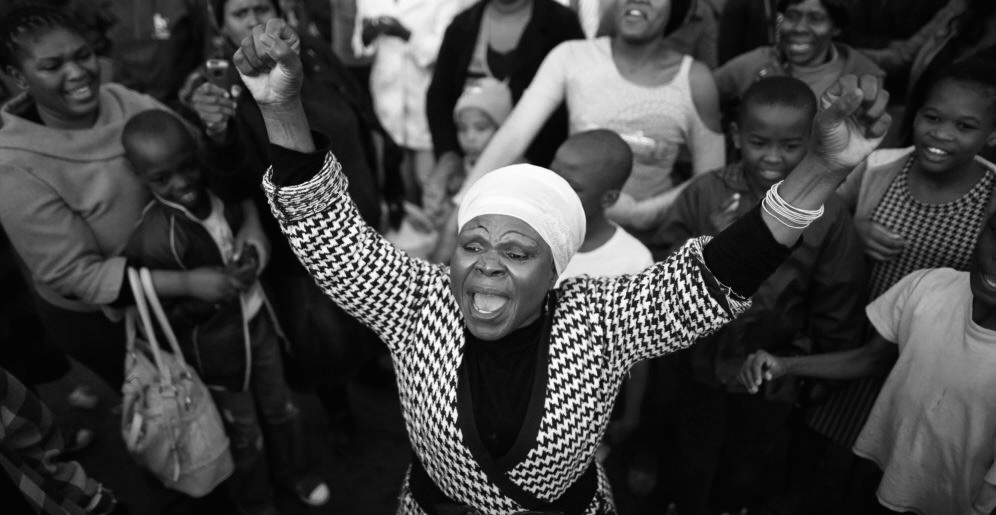
PoliticsRace
black utopia: south africa’s next 25 years of freedom
This year, I share a 25th birthday with South Africa’s democracy and it’s been comforting to witness my country also stumble through its own “quarter-life crisis”. On the 27th of April, we celebrate Freedom Day, which brings into question whether the Black autonomous freedom that was fought for during apartheid could ever be realized when so much of “freedom” is influenced by regimes that use it as a catchphrase of diplomacy.
My freedom has been on my mind more than ever, now that the safety net of milestones has been blown to pieces. The “greatest democracy on earth” buckles under the weight of infiltration from foreign powers, banking powers and lobbyists, inviting a Conservative white nationalist uprising across the globe. America, world police and democracy’s Commander-in-Chief, had its sovereignty compromised on the world stage. Fascists took that (and will always take that) as a cue to sucker-punch wounded freedoms. The most powerful democracy in the world doesn’t operate on a foundation of democratic principles. That influence will only seek to propagate a system that disenfranchises Black people when we need a conception of democracy that will support a Black Utopia.
South Africa is a “democracy” also plagued by its own infiltrating powers, looking to turn the government to further enrich themselves. Two-thirds of South Africa’s population is under 35 while only 6 percent of South Africa’s parliament is made up of MPs of the same age. Unemployment accounts for a third of the country’s youth, and the manifestos of those promising to change that amounts to nothing but pamphlets on an abandoned street. I was taught to write manifestos by a Black man, but I was taught to perfect that writing by a Black woman. When you spend your life arguing for your humanity, you learn to make your motivations clear and your demands heard. I looked to Black women, who often have to shout the loudest to be heard — always managing to move mountains when they finally are. Black women are Black utopias, and if there is any manifesto I believe could shake foundations, it’s that of a young Black woman in a country like South Africa.
“I have stopped waiting.” A manifesto in four words delivered by the co-founder of the Africa Matters Initiative (AMI), Farai Mubaiwa. Mubaiwa made her declaration at a TedX talk in Frankfurt, as a part of an address titled “We are the one we have been waiting for.” Mubaiwa’s address focused on the exclusion of African youth in the solutions to continent’s ills but the overarching message was a rallying cry: “I have stopped waiting because we are the one we have been waiting for.” Mubaiwa and fellow AMI co-founder Reanne Olivier answered that call when they formed the organization as a means developing the skills and leadership skills of young Africans who carry their own visions of how to build their communities. The spirit of Black utopia lives in them and will see the light of day because of them.
Tshepang Makhubedu and Nthabiseng Mphayi are Black women working in corporate, actively wondering how to bring all South Africans into the future now that tech has made certain jobs useless. Their shared manifesto goes as follows:
“The unemployment rate in South Africa is currently 36%. There is an increased number of students who now have access to free higher education but fewer jobs are being produced in the market to meet the increased need. The emergence of Artificial Intelligence means in the very near future most jobs will be replaced by self-service machines. We are in the process of creating a mobile innovation hub that will serve as an opportunity for this generation to drive an innovative culture within communities, schools, and cooperate. We have realized that in order for South Africa to come into a place of competitive economic growth; everyone must be part of the change and that’s why our vision also includes activating all the major cities in the country to be economically significant. This is all in the hope to eradicate the high unemployment rate and to get South Africa in the economic position it has the potential to be in.”
Asisipho Tywana worked in Legal Clinics while studying for her Commerce degree. These clinics would aid wine farm workers who are predominantly Black and poor. The extortion she witnessed being inflicted on these people with little to their name gave her the opportunity to question how commerce can empower Black people instead of sliding them into the hierarchy. Her manifesto went:
“My vision for SA starts with the decolonization of our education system. As a Commerce graduate, I’m constantly entangled between wanting to come up with entrepreneurial opportunities that will serve the black community and begin to undo the engraved white colonial education that’s holding us hostage. I marvel at people like Theo Baloyi and his Bathu sneakers & Dj Sbu with his Moyfaya energy but their businesses aren’t new, aren’t different but we only support them because they are the first Black people to replicate white ideas. I guess my dream is a South Africa is an entrepreneurial Africa that serves African needs. What that is? Even I’m figuring that out.”
The gravity in these manifestos is in the insistence that no one gets left behind. That is Ubuntu: the knowledge that we are empowered through our community. That is Black Utopia, or that’s where it resides at least. I don’t want to recognize myself in 25 years and I want the same for my country. I want us to lean into cultivating a version of freedom that fits us just like I want to build a life that fits me. As far as manifestos go, that’s mine. It’s simple. I want my Black utopia.
Get The Latest
Signup for the AFROPUNK newsletter



